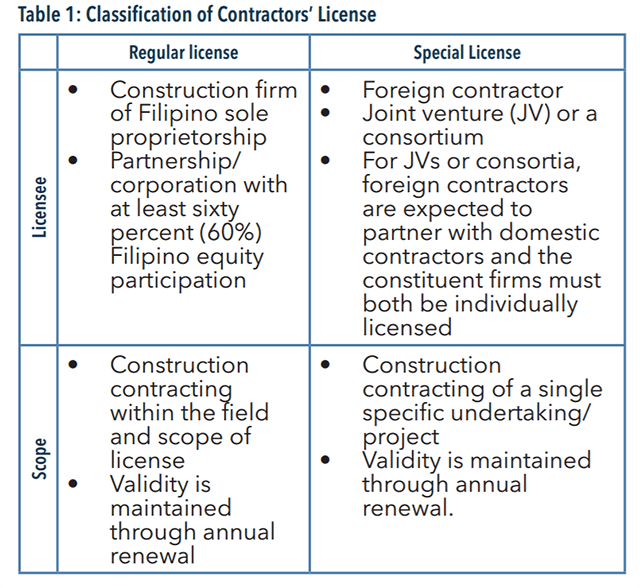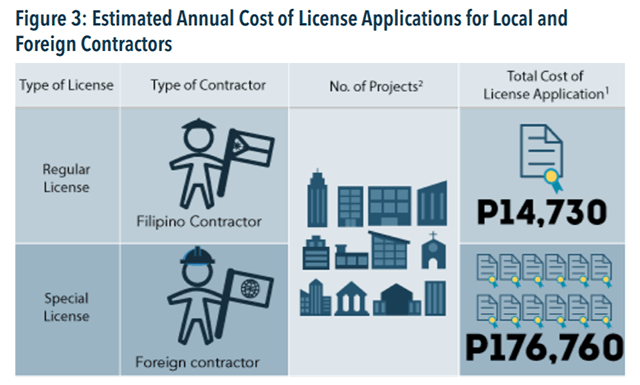SUMMARY
This is AI generated summarization, which may have errors. For context, always refer to the full article.

MANILA, Philippines – Removing restrictions against foreign construction firms could bring in P210 billion worth of private construction projects and lead to more affordable properties, according to the Philippine Competition Commission (PCC).
In its first policy note of the year released on Thursday, February 23, the PCC said “licensing rules implemented by the Philippine Contractors Accreditation Board (PCAB) contain a nationality distinction in its classification of licenses that has deleterious effects on competition in the construction sector.”
PCAB is responsible for issuing, suspending, and revoking licenses of construction contractors under Republic Act (RA) No. 4566 or the Contractors’ License Law.
Foreign firms are required to apply for special licenses which are valid for only a single project. In contrast, firms that are Filipino-owned – 60% or more – get licenses valid for multiple projects.

In effect, foreign firms have to shell out more for doing multiple projects, compared to local firms.
To illustrate this, the PCC estimated that with the average license application cost in Metro Manila of P14,730 and an average of 12 projects undertaken by a contractor in a year, a foreign firm will have to spend a total of P176,760.
This is 12 times the estimated potential cost – for the application process alone – to engage in the same level of activity as with a local firm.

The PCC pointed out that while a regular license may be issued to partnerships and corporations with up to 40% foreign equity, “foreign firms are likely to be discouraged to enter the market through such option, as it is exposed to the risk of not having full control and management over their investments.”
The PCC added: “Nationality-based distinction hinders competition in the construction industry, creating an uneven playing field between local and foreign contractors. Foreign firms possess capacity to construct vital projects and share technical expertise with local firms.”
Limiting potential
The effect of this uneven playing field is magnified by the scale of the construction sector, which is vital for the functioning of other industries including transportation, power, water, and housing.
The construction sector’s gross value grew by 40% between 2010 and 2015, with public construction growing by 8% and private construction growing even more substantially at 58%.
In 2015, the construction sector also employed over 2.71 million Filipinos, constituting 7% of total employment.
But the licensing arrangement has led to limited foreign participation, emphasized the PCC. It said that a survey from 2013 to 2015 showed new special licenses accounting for just 10% to 15% of total licenses issued during the period.
In 2015, the survey showed that out of 1,600 special licenses issued, only 20 were issued to foreign firms and 4 were issued to joint ventures or consortia with foreign participation.
The PCC added that actual foreign participation may be significantly lower, as special licenses are also being issued to local firms in consortium or joint venture arrangements.
“Comparison with other ASEAN countries indicates that the Philippines is already suffering from inflated construction costs and is also lagging behind many countries in terms of quality of infrastructure,” the PCC also said.

According to the World Economic Forum (WEF) Global Competitiveness Report 2016-2017, the Philippines ranks 95th out of 138 countries in terms of infrastructure. The quality of overall infrastructure here ranks even lower at 112th out of 138 countries.
“The participation of foreign firms in the construction industry is seen to generate growth due to the considerable scope for learning-by-doing, knowledge generation, expansion of product variety, and an upgrade on product quality,” noted the PCC.
“Restrictive rules which do not take into consideration market competition are very likely to diminish both short-run and long-run efficiency improvements. Consumer welfare, which in this case refers to the welfare of both households and other businesses, is maximized when competition allows consumers to access and choose the most efficient producers, regardless of the service provider’s nationality,” it added.
Unconstitutional
Besides limiting the economic potential of the construction sector, the PCC also said the licensing arrangement violates Article 12, Section 19 of the Constitution, which states that “no restraint of trade or unfair competition shall be allowed.”
This, the PCC argued, is enough basis to nullify policies which restrain competition.
“Such acts can range from laws passed by Congress, to rules and regulations issued by administrative agencies, and even contracts entered into by the government with a private party,” it said.
The PCC added that it already submitted its expert legal analysis of the matter to the Supreme Court in December 2016, as part of the PCAB-Manila Water Company case.
“The resolution of the said case is expected to make a significant impact on the dynamics and level of competition in the construction industry,” the PCC said. – Rappler.com
Add a comment
How does this make you feel?
There are no comments yet. Add your comment to start the conversation.